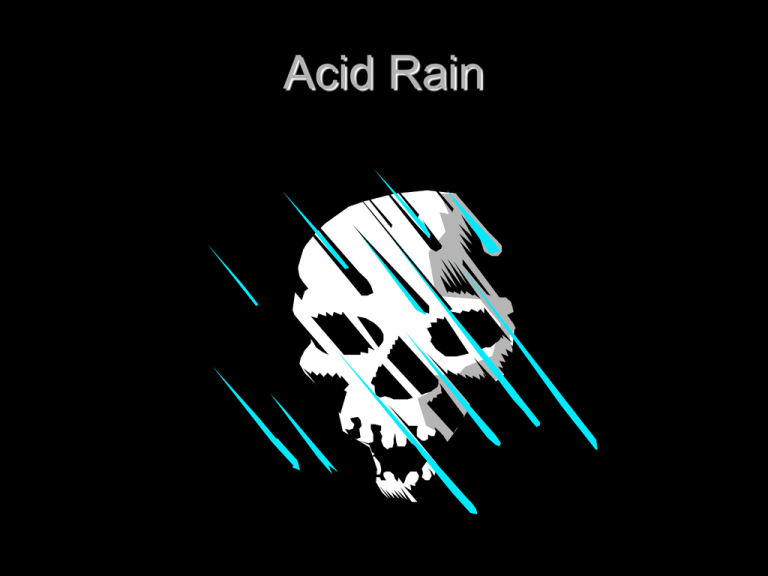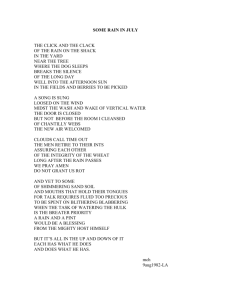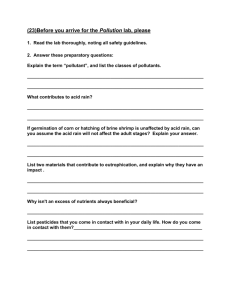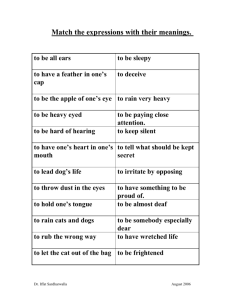Acid Rain
advertisement

Acid Rain What is acid rain? Acid Rain is rain that has been contaminated by air pollution and as a result causes harm to the environment when it falls to the earth. What causes Acid Rain? Acid rain is a result of air pollution. When any type of fuel is burnt, chemicals and gases are produced in the form of smoke. Holy Smoke! So smoke doesn’t just contain the sooty grey particles that you can see - it also contains lots of invisible gases and chemicals that you can’t see. These chemicals can be harmful to our environment. Power stations, factories and cars all burn fuels and therefore they all produce smoke containing harmful chemicals and gases. Some of these gases mix with the tiny droplets of water in clouds to form sulfuric and nitric acids. The rain from these clouds then falls as weak acid which is why it is known as "acid rain". From the City to the Country Whew! Very strong acids will burn if they touch your skin and can even destroy metals. But acid rain is much, much weaker than this . . . never acidic enough to burn your skin. But even so… When rain has become acidic, it affects nearly everything it falls on . . . trees, lakes, buildings and farmland. Sometimes acid rain is not very strong and does not cause a lot of problems. But when it is strong, it can be very harmful to the environment. Effect on Trees Acid rain can effect trees in several different ways. It may: Dissolve and wash away the nutrients and minerals in the soil which help the trees to grow. Cause the release of harmful substances such as aluminum into the soil. Wear away the waxy protective coating of leaves, damaging them and preventing them from being able to photosynthesize properly. Not just the trees. . . A combination of these effects weakens the trees which means that they can be more easily attacked by diseases and insects or injured by bad weather. It is not just trees that are affected by acid rain, other plants may also suffer. . . . but the water too. As acid rain falls on a forest it trickles through the leaves of the trees and runs down into the soil below. Some of it finds its way into streams and then into rivers and lakes. As a result. . . Forests all over the world are dying. Whole sections of forests in Germany have been wiped out. In Scandinavia there are dead lakes, which are crystal clear and contain no living creatures or plant life. The fish have all died. Many of the U.K.'s freshwater fish are threatened and there have been reports of deformed fish being hatched. What about buildings? Nearly every type of building material will become eroded sooner or later by the natural effects of weather such as wind, ice and snow. Unfortunately, acid rain just makes it worse. Statues, buildings, vehicles, pipes and cables can all suffer when exposed to acid rain. Buildings and structures made from limestone or sandstone suffer the worst as these types of rock are particularly susceptible to corrosion caused by acids. Where does it come from? Until recently air pollution has been seen as a local issue not a national problem. It was in southern Norway in the late 1950's that the problems of acid rain were first observed, and it was then that people began to realize that the origins of this pollution were far away in the U.K. and Northern Europe. The problem is that . . . Air pollution can be carried over long distances. When acid gases are released, they go high up in the sky, and then they are pushed by strong winds towards other countries. So . . . The acid rain in Sweden is caused by air pollution in the U.K. and other countries of Europe. The pollution produced in the U.K. ends up mostly in Scandinavia - countries in northern Europe including Sweden, Norway and Denmark. That didn’t work! One early answer to industrial air pollution was to build very tall chimneys. Unfortunately all that did was to push the polluting gases up into the clouds so the pollution could just float away. The wind carried the pollution many hundreds of miles away where it eventually fell as acid rain. Bad Guys! Over ninety percent of Norway's acid pollution comes from other countries. The worst European polluters are Germany, U.K., Poland and Spain, each of them producing over a million tons of sulfur pollution in 1994. Acid Rain in Europe What’s being done? European governments are now beginning to admit that acid rain is a serious environmental problem and many countries are now taking steps to reduce the amount of sulfur and nitrogen emissions from their factories. But it may be too little and too late for many forests and lakes.






